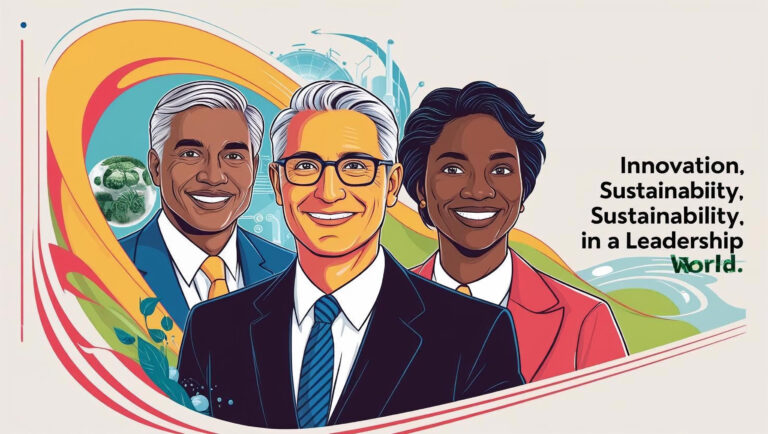
The global business landscape is undergoing unprecedented transformation. From AI-driven disruption to climate-driven regulations, CEOs face a complex web of challenges and opportunities. In this era of volatility, resilience, agility, and ethical stewardship are no longer optional—they define survival. This cover story explores the forces reshaping industries worldwide and how visionary leaders are steering their organizations toward sustainable growth.
1. The Acceleration of Digital Transformation
Key Theme: “AI, Automation, and the Race for Relevance”
The post-pandemic world has fast-tracked digital adoption, with AI and automation at the forefront.
-
Data Point: The global AI market is projected to reach $1.8 trillion by 2030 (Statista).
-
Case Study: Microsoft’s integration of ChatGPT into enterprise tools exemplifies how generative AI is revolutionizing productivity.
-
Challenges: Cybersecurity threats, ethical AI governance, and bridging the digital divide.
-
Leadership Insight: “AI isn’t replacing humans—it’s amplifying human potential,” says Satya Nadella, CEO of Microsoft.
2. Sustainability as a Strategic Imperative
Key Theme: “Beyond Greenwashing: Building Authentic ESG Frameworks”
Investors and consumers now demand accountability. ESG metrics are reshaping corporate strategies.
-
Data Point: Global ESG assets could hit $53 trillion by 2025 (Bloomberg).
-
Case Study: Unilever’s “Future Foods” initiative aims to reduce emissions by 50% while doubling plant-based product lines.
-
Opportunity: Circular economy models and green tech investments (e.g., hydrogen energy, carbon capture).
-
Leadership Insight: “Sustainability isn’t a cost—it’s the ultimate driver of innovation,” says Alan Jope, former CEO of Unilever.
3. Geopolitical Uncertainty and Supply Chain Resilience
Key Theme: “From Fragility to Flexibility”
Trade wars, pandemics, and climate events have exposed vulnerabilities in global supply chains.
-
Trend: Nearshoring and “friendshoring” to mitigate risks (e.g., Apple diversifying production from China to India and Vietnam).
-
Innovation: Blockchain for transparency, AI-driven demand forecasting, and 3D printing for localized manufacturing.
-
Leadership Insight: “Resilience requires redundancy and real-time data,” says Vincent Clerc, CEO of Maersk.
4. The Future of Work and Talent Management
Key Theme: “Hybrid Work, Upskilling, and the Human-Centric Workplace”
The talent war continues, with employees prioritizing flexibility, purpose, and growth.
-
Data Point: 58% of workers now prefer hybrid models (Gartner).
-
Case Study: Siemens’ “New Normal” initiative combines remote work with AI-powered upskilling platforms.
-
Challenge: Addressing burnout and fostering inclusivity in dispersed teams.
5. Leadership in a Time of Disruption
Key Theme: “Adaptive Leadership for a VUCA World”
Volatility, uncertainty, complexity, and ambiguity (VUCA) demand leaders who balance empathy with decisiveness.
-
Trend: Stakeholder capitalism gains momentum, prioritizing long-term value over short-term profits.
-
Case Study: Patagonia’s bold transfer of ownership to a climate trust underscores mission-driven leadership.
-
Leadership Insight: “The CEO’s role is to be a chief storyteller, uniting teams around a shared purpose,” says Hubert Joly, former Best Buy CEO.
6. Emerging Markets and Untapped Opportunities
Key Theme: “The Rise of the Global South”
Africa, Southeast Asia, and India are becoming innovation hubs.
-
Data Point: India’s digital economy could reach $1 trillion by 2030 (McKinsey).
-
Opportunity: Fintech in Africa (e.g., Flutterwave), green energy in Brazil, and health tech in Indonesia.
The future belongs to organizations that blend innovation with integrity. CEOs must:
-
Embed sustainability into core business models.
-
Leverage AI ethically to drive efficiency and creativity.
-
Build agile, people-first cultures.
-
Collaborate across borders to solve systemic challenges.
As Siemens CEO Roland Busch notes, “The companies thriving today aren’t just adapting—they’re anticipating.” In this new paradigm, leadership is less about predicting the future and more about shaping it.
“The question isn’t whether disruption will come—it’s whether you’ll be the disruptor or the disrupted.”